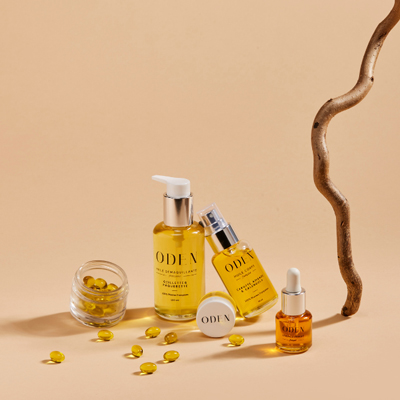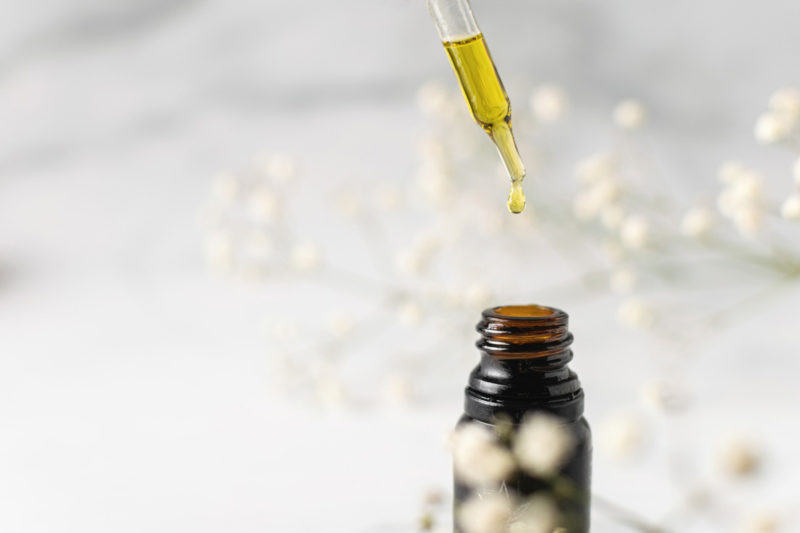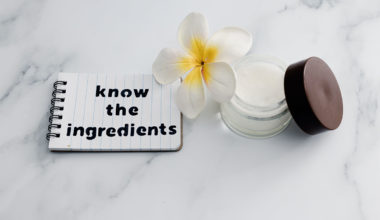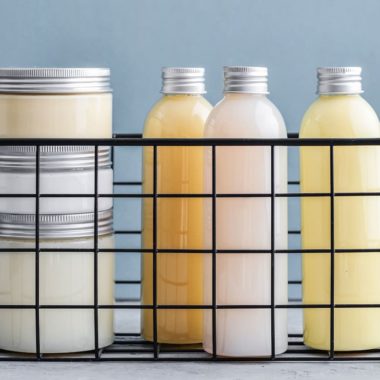Plant-based oils for the body or face are very popular right now. At a time when people are looking for safe formulations and naturalness, oils are the perfect skincare solution. But are they really clean, and how do you pick one? Let us walk you through it!
What’s the difference between plant-based oil and mineral oil?
First of all, a distinction has to be made between natural oils and those derived from petrochemicals. The latter, known as mineral oils, are synthetic. They have beneficial properties for allergy-prone or reactive skin, since being odourless and invulnerable to oxidation, they are completely inert vis à vis the skin. They form a stable film barrier on the skin, which promotes healing and prevents transepidermal water loss (known as TEWL), like a lid that prevents evaporation. Moreover, they cost little. For all these reasons they are found in a great many skin repair, cold defence and anti-chapping products.
Unfortunately, mineral oils do not treat skin complaints, since they do not get assimilated by the skin and contain no active ingredients like vitamins. And unlike plant-based oils, which after all come from plants, mineral oils are not biodegradable. In addition, they are the product of the processing of petrochemical industry waste material yielded by refining, with production processes that are bound to be polluting. In terms of ecology, mineral oils are really quite harmful… But are are plant-based oils any cleaner?
Are plant-based oils clean?
Plant-based oils are made from the fats found in nuts or oilseeds. They are yielded via mechanical extraction processes (referred to as “cold” pressing). This allows the oily macerate to keep all of its properties intact, with a high level of purity. Because these plant-based oils are high in active ingredients, essential fatty acids and vitamins which lend them specific virtues: they are antioxidant, nourishing and regenerative. These plant-based oils each have their own features and beauty effects. Borage, evening primrose, sweet almond, sesame, hazelnut and macadamia oils, and shea butter, are all natural skincare options. They are hypoallergenic, easily absorbed by the skin, well tolerated and biodegradable by nature. However, a distinction has to be made between a pure plant-based oil and a product that contains one. Because a plant-based oil can be added to a synthetic formulation to lend curative action to it. But are these plant-based oils as virtuous for the planet as they are for the skin? The answer lies on the production side. So you’ll want to look out for family producers and local producers when examining the packaging!
Organic plant-based oils made in France
Production within the country of sale (in our case France) vouches for minimal freight transport impact and also working conditions, which is not the case for plant-based oils that come from the other side of the world.
For example, the coconut oil craze is inflicting ecological damage in foreign countries. In Indonesia, French Polynesia and India, demand from Western countries is such that growers are switching to monoculture. They are doing so at the expense of food crops to feed local populations which allow them to be self-sufficient. This spike in demand, which creates competition between producers, opens the way towards exploitation and increasing poverty of populations. Then the coconut oil has to be shipped over to us, which generates CO2 emissions. So even plant-based oil labelled as organic or sustainable has negative ecological impact, unless it’s produced locally. Hence the importance of local production. And here in France, we are fortunate enough to have growers who not only produce French plant-based oils, but do so the organic way. Organic certification vouches for the absence of pesticides, and adherence to a stringent, set schedule of specifications. It also means reduced freight transport for these plant-based oils made in France, which producers often sell directly and locally (listed, among others, on the slow-cosmetique site). Their ecological impact is lessened even further if they are organic.
Packaging and brand

A brand that claims to be clean in terms of production must also be clean in terms of packaging. That said, there is little chance that a French clean or organic oil will see its positioning undermined with plastic outer packaging. Plant-based oils are generally sold in glass bottles, either just as they are or in cardboard slipcases.
Like most beauty products, plant-based oils are processed in a way which can generate pollution, CO2 emissions and social problems. As always, local production means minimal freight transport and adherence to the standards in force, as well as compliance with labour laws. It often comes at a higher price, since inevitably you pay more for a quality product. Conversely, rock-bottom prices are a clue as to where production takes place and under what conditions… So what’s the advantage of plant-based oils? Well, like all beauty oils, they are very economical in terms of their use over time. A little goes a long way! So it’s a good investment for both yourself and the planet!







